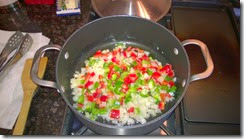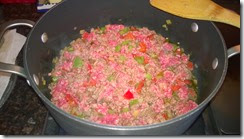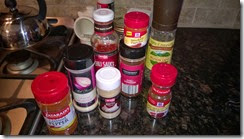So Randall Munroe of XKCD fame recently published his book What If, which is just a terrific mix of “I never thought of that” and “LOL”. One chapter discusses if you can cook a slab of meat by dropping it out of the atmosphere, which turned into Randall Munroe mentioning scientifically what it takes to cook something, which led to him referencing Cooking for Geeks by Jeff Potter. My co-worker and I always laugh when we talk about how easy it is to buy something nowadays. It’s like… you think about it, impulse buy, and you have it. So.. guess who bought Cooking for Geeks?
Inspired with my new purpose, I wanted to cook. It was a lazy Saturday, the weather was a little cold out, and I like meat. So, I made chili. Of course I needed some help, so my wife guided me to ensure I didn’t screw up (which I still kind of did), but in the end.. I did it! I made chili that was edible.. and pretty tasty too.

I started with 2 cloves of garlic, diced it as fine as I could without cutting my fingers off, and threw it in a pot with some oil and chopped onion’s to simmer. (Youre thinking “Why didn’t he mention dicing onions, and it’s because they were frozen and in a bag, what’s the point in referring to today as a lazy Saturday if you’re not a little bit lazy?). Then my wife said “Let that go for a while and add your peppers”.. all I heard was “blah blah blah add peppers”. I diced up one red and one green bell pepper.. and that yielded a lot of peppers! So I took half of that yield and threw em in the pot (the other half went into the freezer so next time I’m making chili I can be even lazier and not chop anything). That cooked on medium heat until the garlic started to brown… it took a little longer than normal apparently since I added the peppers so early.

I then added the meat to the mix and started to chop it up, slowly turning the meat to get it to brown. Every few minutes I gave it a turn to also make sure that the garlic\oil mixture didn’t start to burn. Once I got the meat browning, I turned the heat down some as well.. I’d like to take full credit for this executive decision, but honestly, my wife said “hey, turn the heat down so the garlic\oil mixture doesn’t burn”.. and after the “mishap of the chopped pepper’s”, I decided to listen this time.

Once the meat got cookin’, I started adding some.. you know.. flavor. I started with a Tablespoon of chili powder (only 1T because it was so salty), and 1T of mexican spicy chili powder, which wasn’t nearly as salty as chili powder Americana, but also had some cumin in it that added.. umm.. something cuminy. The rest was more or less a season-to-taste mixture of paprika, smoked paprika, Cayenne pepper, black pepper, onion powder, garlic powder, and 1/2 to 2/3 a bottle of chili sauce (again.. season “to taste” is the idea here). I also threw into the mix a Left Hand Nitro Milk Stout. I really like this beer, it’s considered a “sweet stout”, and it’s like having a Guinness stout, but instead of a bitter finish you get sweet.. and a note of coffee. So half a bottle of beer went into the mix as well. I also added a can of chopped tomato’s, red kidney beans and black beans. After all, what’s chili without beans?

As I said before, this was all season to flavor, so many of the elements mentioned above were added over time (specifically, I kept adding chili powder - “Chili P is my specialty yo!” for all of my Breaking Bad fans out there – pepper, Cayenne pepper, and garlic\onion powder over time). I put the heat on low, put the lid on, and let it simmer, giving the occasional stir. Pro-tip, there’s beans in there, go easy when stirring as to not break up and destroy the beans!

So I started cooking around 3 PM, had the meat in the pot with the aforementioned ingredients by 4PM, and I ate dinner at 7. So, my ingredients had a few hours on a lower heat to really blend, and in the end, I’m happy with how they did. There was a hint of sweet in the chili, that could be from the beer, it could be from the chili sauce, or it could be in my head. I like sweet things in general, but my aim wasn’t to make this sweet, I really just thought I picked up on something sweet, but not overpowering, which I’m fine with. When I’ve cooked in the past I’ve had issues over-seasoning one time, and under-seasoning the next. So, with guidance from my wife, I’m proud that I didn’t screw up!
 What If?: Serious Scientific Answers to Absurd Hypothetical Questions by Randall Munroe
What If?: Serious Scientific Answers to Absurd Hypothetical Questions by Randall Munroe





